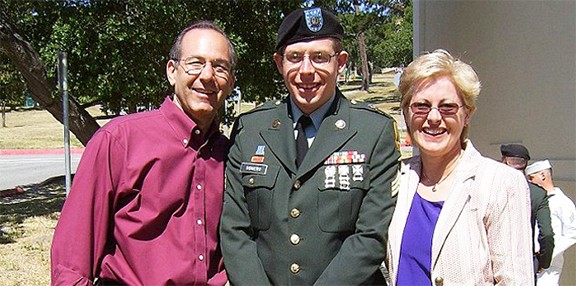After his second deployment, Daniel was diagnosed with post-traumatic stress disorder, a traumatic brain injury suffered during combat and several other medical issues.
Nearly a decade after he joined the military, 30-year-old Daniel died from a self-inflicted gunshot wound to the head, down the street from his home in Phoenix.
His carefully written suicide note detailed the exact reasons why he decided to take his own life. He expressed remorse over the lives he took in combat, frustration with the Department of Veterans Affairs that failed him in his time of need, and questioned the lack of federal action on a widespread issue that causes 22 veterans on average to die by suicide every day.
Daniel's parents, Howard and Jean Somers, used his final message as instructions for what to do next. Since their son died in 2013, the couple has dedicated their lives to advocating for VA reform and mental health support programs for service members and veterans nation-wide.
They lobbied for the creation of a federal Network of Support, where information about the experiences and challenges of military service—especially during overseas deployment and reintegration to civilian life—is shared with designated relatives and friends of service members.
"It's really the first thing that we identified as an issue that we had with our son," said Jean. "We're not military, so we really didn't understand the military experience at all. We were totally dependent on Daniel and his wife to explain things to us. We realized that's not a very efficient way of doing things."
Jean and Howard assumed that the VA would take care of any issues Daniel was facing after he returned home. But today, they say that only 40 percent of veterans are being seen by the VA.
"When he came back and he was so changed, because we really hadn't understood the experience, we didn't know how to approach him, we didn't know how to talk to him, we didn't know what resources were available to him, or to us," Howard said.
The couple says they have talked to "innumerable" parents and family members who experienced the same thing with their loved ones who were in the military. One mother described to them her daughter's experience serving in the Marines, saying it was like "she just walked into a black box."
In Arizona, veterans face three times the risk of PTSD, depression and suicide compared to non-veterans. A local organization is taking a proactive approach to combat the roots of the problem.
Created through the Arizona Coalition for Military Families, the Be Connected program is helping veterans, service members and their families quickly find resources that can help with problems from employment to housing. All they have to do is call a single phone number.
"In the past, a lot of service members or veterans have said, 'Why did it get to a point where I had to get to crisis to find out there's all these different resources available to me?'" said Kelly Anne Wilde, assistant director of programs for the Arizona Coalition for Military Families. "What we really try to do with the Be Connected program is make all those resources are easily accessible and easy to find."
She calls Be Connected an "upstream suicide prevention approach" focused on meeting veterans' and service members' needs before they become life-threatening.
For example, a service member preparing to reintegrate back into civilian life may experience difficulty finding a job. Wilde says there are many different resources that help veterans access employment, but finding those organizations may be challenging. Be Connected is able to step in and act as a centralized service for a variety of social needs, and provide direct contact to organizations they vet themselves.
"Getting them the resources to help find gainful employment is also a way to keep them from getting to that point to where they have financial struggles, and that can cause relationship struggles, and it moves you further down that spectrum of getting closer to crisis," Wilde said. "So we want to be able to catch those things before it moves in that direction."
If a person who calls the support line is experiencing a complicated or difficult situation, Be Connected will send a "navigator" to meet with that individual and have a face-to-face conversation about their issues. Wilde, an Army veteran herself, says their approach has seen real success in its short history.
"Because we're maximizing the utilization of what already exists and doing that in a collaborative way, the main thing is that the program really truly works," she said. "When people start interacting with it, they say this is life-changing."
Since its inception in 2017, Be Connected has helped more than 20,000 Arizona residents access community resources. There are more than 600,000 veterans, service members and family members living in the state, according to the Arizona Department of Veterans' Services.
Be Connected is receiving more support from state government. Gov. Doug Ducey included an extra $1.2 million in his fiscal year 2020 budget to expand the program's services across the state.
The program's hotline (1-866-429-8387) is not exclusively for veterans and service members. Friends, family members, neighbors or anyone who is interested in serving the veteran community can call in and receive advice on how to help someone who may be struggling.
The other major component of Be Connected is the Resource Navigation training. The three-hour class focuses on preparing volunteers to help a veteran or service member access the available resources that are most relevant to them, and offering insight into military/veteran culture and the factors that may affect an individual's access to help.
More than 4,000 individuals have been trained in Resource Navigation.
"We really look at it like an extra tool in your toolbox to be able to help, sort of like a CPR training," Wilde said. "You don't know if you'll ever have to use it, but at least you have it if you do need to use it."
Be Connected also organizes community-building events, a variety of support groups and free workshops for veterans, service members and their families.
"This is a network of people that really care and are going to do what they can to give all the resources they need," Wilde said. "It's a program that gives people hope."
After Daniel's suicide note went viral, the Somers testified before the House Veterans Affairs Committee about issues with the VA and the lack of mental health support provided to veterans. Howard said many legislators were "very sensitized" to their struggle and were motivated to work on bipartisan solutions.
"It's been a very rewarding experience to see how people can actually come together and work to create something that everybody feels will be a benefit to our enlisted service members," he said.
Members of Arizona's congressional delegation have highlighted veteran suicide prevention—and by extension, veterans' access to resources—as a priority. Each of them co-sponsored the Phoenix VA Congressional Oversight Act, which created a pilot program to improve the Department of Veteran Affairs' constituent services in Arizona.
Democratic representatives Tom O'Halleran of District 1 and Ruben Gallego of District 7 had a hand in the fiscal year 2020 appropriations bill for the VA and worked to incorporate language that requires the department to improve the effectiveness of its suicide prevention outreach campaign. The bill also requires the VA to specify what they will use their suicide prevention funding for.
"Almost five years removed from a horrific scandal, the Phoenix VA Health Care System is still one of the most-poorly run VA facilities in the country," said Rep. O'Halleran in a statement. "We have an obligation to provide oversight of the VA to ensure the care improves, and this bipartisan legislation will allow us to do that."
Rep. Ann Kirkpatrick of District 2 (which covers most of Southern Arizona) says there is a large veteran community in the area and 40 percent of her office's constituent cases relate to veterans' issues.
Her office works with the Be Connected program as well as a Veterans Advisory Committee to identify gaps in resources and the changing needs of veterans.
"As a member of the Appropriations Committee, I have helped advocate for $222 million in funding for suicide prevention outreach," Kirkpatrick said in a statement. "And I supported language in the appropriations bill encouraging the VA to seek out public-private partnerships with research universities, teaching hospitals and other partners, to expand upon its existing efforts related to suicide prevention, PTSD, traumatic brain injury and substance use disorders."
Sen. Kyrsten Sinema has co-sponsored several bills related to veteran suicide prevention, including the Sergeant Daniel Somers Network of Support Act, which created the Somers' program to provide information on military culture and social resources to family members of those in the Armed Forces.
Sinema also co-sponsored the Support for Suicide Prevention Coordinators Act, which requires the Government Accountability Office to study and report on what resources and tools the VA supplies to its suicide prevention coordinators.
"Suicide among our veterans and servicemembers is a national crisis," said Sinema in a press release. "Ensuring suicide prevention coordinators have every tool available will help prevent veteran suicide, and deliver the care and support our veterans have earned."
The Somers are now working on lengthening the amount of time that service members have to reintegrate back to civilian life and complete classes with mentors that will help with the transition.
"To make sure that they understand how to handle things financially, to make sure that their relationships are solid before they get out, to make sure that they have housing, to make sure that they're emotionally ready to reintegrate, and to provide them whatever they need to get a job, to make sure they have all of that before they actually get out," Jean said.











